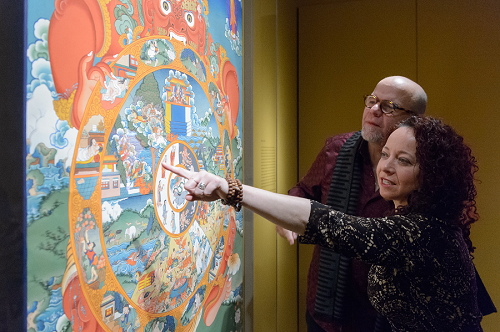
This week at the Rubin, we’re examining the emotion of sadness in conjunction with Brainwave 2016: Emotion. Sadness is a natural part of life but we often take drastic measures to avoid feeling sad. We forget that sad emotions can be useful and even play an important role in our mental health.
That being said, sometimes our sadness can get the better of us. Here are six things that you can try if you’re feeling upset or disappointed:
1) Practice mindfulness through meditation

The practice of meditation is designed to transform the mind and bring about a new relationship to life and its obstacles. Set aside a couple of minutes of your day to settle and focus your mind. According to The New Medicine, your breath becomes restrained when you’re sad. You inhale forcefully and exhale feebly. Mediation will help you become more mindful of your breath and your emotions, preventing harmful feelings from lingering inside you.
Need some motivation to start meditating? Every Wednesday, the Rubin Museum hosts its Mindfulness Meditation sessions where you can join others of all experience levels in silent reflection. If you’re not in New York City or constantly on-the-go, you can subscribe to our Mindfulness Meditation podcast.
2) Get enough sleep

Have you ever been told to “sleep on it?” The National Sleep Foundation recommends that adults get at least 7 to 9 hours of sleep each night to maintain a healthy well-being. Having an inadequate amount of zzzzz’s can lead to higher levels of stress and irritability. The National Sleep Foundation suggests a list of tips and tricks to help you sleep better and longer; among them: stick to a sleep schedule, avoid naps during the day, and exercise normally.
3) Realize that it’s ok to be sad”¦ or even depressed
“Happiness follows sorrow, sorrow follows happiness, but when one no longer discriminates happiness and sorrow, a good deal and a bad deed, one is able to realize freedom.”
““ quote attributed to the Buddha (SiddhÄrtha Gautama)
Emotions are like waves, they come and go in cyclical movements. It is normal (and okay) to undergo bouts of sadness. Feeling sad is a natural reaction to being overwhelmed or experiencing a loss or failure.
For some people, sadness can progress to a depression and that’s when things get serious”¦ If you’re unsure if you’re depressed, it’s always best to seek advice from a medical or mental health professional. Either way, it’s important not to run away from your feelings. By acknowledging and sharing personal experiences, we both help ourselves and empower others.
Join us at the Rubin on March 18, when comedian Jacqueline Novak will share stories about her struggle with depression and learn how being depressed affects the mind from a leading expert on the brain.
4) Get your creative juices flowing

Having a particularly stressful week at work? Maybe a trip to an art museum is the key to helping you unwind. It’s been observed that simply observing art can make you happier, more creative, and open to new possibilities!
If you need a suggestion for an artsy night out in New York City, stop by the Rubin for K2 Friday Nights. On Fridays, Museum admission is free from 6-10 p.m., giving you plenty of time to browse our latest exhibitions, like Steve McCurry: India, and enjoy the live music, tapas, and cocktails in the K2 Lounge.
5) Write it down or tell a friend
It’s not healthy to keep all of your sad thoughts to yourself. Keeping a journal, or even just occasionally jotting down feelings, can allow you to organize and express your inner thoughts. Writing can help you to relax and process your thoughts so that you can understand your hurtful emotions.
If you’re not crazy about journaling, you can also reach out to a friend, family member or a professional you trust and let them know how you’re feeling.
6) Let it go!
Buddhism’s second noble truth tells us that suffering, or sadness, comes from attachment to desire. We always want a nicer apartment, more high-end shoes, a better job”¦ and when we don’t get what we want, we find that we become angry, envious and upset.
Most often the things that make us sad are largely out of our control, but learning to accept that is not easy. Take a step back and gaze on the bigger picture. Be thankful for what you presently have and let go of your hurtful attachments.
(Disney’s Frozen / Via GIPHY)
Explore more of your emotions at our next Brainwave event! Learn more about Brainwave 2016: Emotion.

